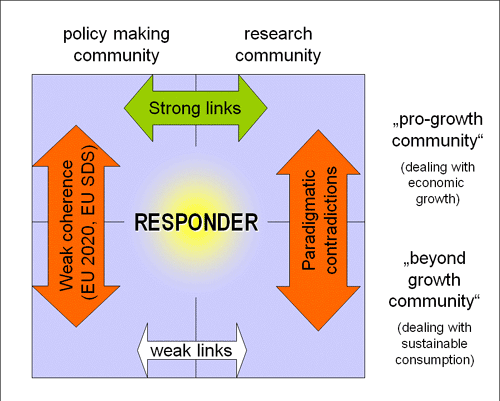   |
|
 |
 |
 |
RESPONDER > about |  |
|
AboutRESPONDER deals with potential political, social and economic contradictions between sustainable consumption and economic growth. The project focuses on consumption decisions made by private households, considering their rationalities, options and factors affecting their decision making, and focusing on the impacts of these decisions on sustainability and/or economic growth as well as viable policy options. To gain an integrative perspective, research findings from social-psychology oriented research on consumer behaviour will be linked with macroeconomic theories on and approaches to economic growth (and thereby also to the debates on green growth, beyond growth and de-growth). The challenge is linking four communities: linking science and policy has already been recognised as a challenge, as these social systems follow different rules and rationalities. RESPONDER faces an additional challenge, as it will have to improve the mutual understanding of what could be called the “pro-growth community” (mostly mainstream economists and policy makers oriented towards the EU Lisbon Strategy) and the “beyond-growth community” (mostly scientists highlighting biophysical limits to growth, social movements in several European member states and policy makers involved in the sustainable development debate). Therefore a highly innovative knowledge brokerage system will be developed and implemented that supports a structured dialogue between researchers and policy makers across Europe.
Mutual understanding requires a systemic approach: RESPONDER will carry out participatory system mapping; this methodology has successfully been used in several research-based decision-support projects and offers an interesting opportunity. So called “system maps” can support mutual understanding and knowledge transfer, constitute the basis for systematising empirical findings, questioning different model assumptions, analysing the effects of different policy options and identifying new research questions. RESPONDER will use this methodology for the first time to link two high-stake policies (sustainable consumption and growth), with a high number of different actors’ mindsets, paradigms and rationalities. |
|||


 |
© 2024 Institute for Managing Sustainability |
The RESPONDER project is funded by FP7 under the Environment (including Climate Change) theme. |
 |

